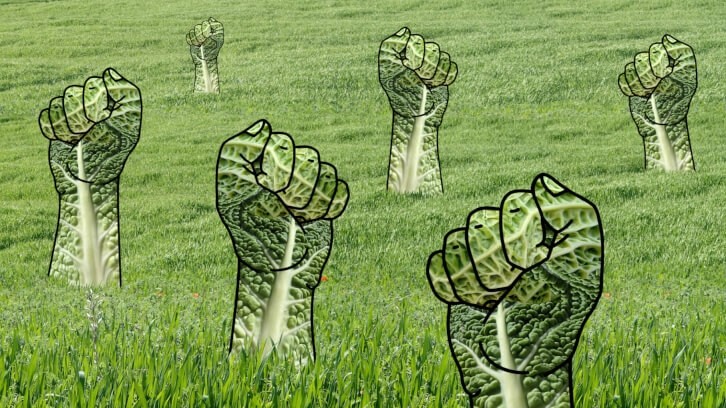Legal Brief
Farmergeddon!

Changes in UK Fresh Produce
In the early 90s, the UK produced around 85% of the vegetables it consumed. By 2022 this figure was just 53%.
In 2020, 119,000 hectares in the UK were dedicated to growing cabbages, carrots, cauliflowers, broccoli, lettuces, mushrooms, onions and tomatoes. By 2022 that figure was 107,000 hectares. Land dedicated to fruit production and potato production also fell, the latter by almost 20,000 hectares.
Last year saw supermarket shortages across various lines, including tomatoes, cucumbers, peppers, broccoli, cauliflower, raspberries and lettuces.
2023 was also the year that saw farmers regularly protesting. Their protests have bled into 2024, the latest, at the time of writing, being staged outside parliament on Tuesday 26 March.
In short, farmers are not happy.
They have many complaints, but most centre around trade deals and prices paid for their produce and labelling.
Government response
The only response we have had so far from UK Government is an instruction to ‘eat turnips’. Putting that flippant comment aside, the Government are ‘on it’, with several initiatives likely to shake up the fresh produce sector.
Brexit saw the abolition of the common agricultural policy (CAP) and the introduction of the Agriculture Act (AA) 2020, which brought with it a new agricultural system. On top of addressing subsidies under the CAP, it introduced an obligation on the Government to review food security every five years and granted powers to Defra to introduce new laws to protect farmers.
On 9 May 2023, the EFRA Commons Select Committee launched an inquiry into ‘Fairness in the food supply chain’. Then on 14 December 2023, Defra opened a consultation on ‘Contractual relationships in the UK fresh produce industry’.
Prompted by an ‘e-petition’, gaining 112,000 signatories, 22 January 2024 saw the House of Commons debating on ‘reforming the Groceries Supply Code of Practice to better protect farmers’. Around the same time the Groceries Code Adjudicator (GCA) asked retailers to provide information about the quantity of goods they purchased through intermediaries compared to the quantity purchased direct from growers.
And just weeks ago, on 12 March 2024, Defra launched another consultation ‘to make food labelling fairer and clearer’ to ‘ensure British farmers’ products get the recognition they deserve’.
There is, undoubtedly, a political appetite to help British farmers.
But will anything change…?
Where there is a will, there is always a way. It seems to me that two things will probably happen in 2024.
The GCA
The easiest and quickest route to improving the landscape for British farmers is through the GCA. The GCA is obviously concerned about farmers not benefitting from the Groceries Supply Code of Practice (GSCOP) – a code which regulates the contracts between the top 14 grocery retailers and any direct supplier because farmers, generally, deal with retailers through intermediaries. If a farmer supplies through an intermediary, the intermediary benefits from GSCOP, not the farmer. The benefits don’t always trickle down.
The GCA told EFRA that it has discussed with retailers what they are doing to enhance their understanding of crop growing cycles and the challenges created for producers by any late setting of supply programmes; and asked retailers to consider improved training for buyers and to extend the period of time buyers spend in a particular category to improve their knowledge of suppliers’ concerns and challenges.
The GCA claims “Retailers are committing to making these changes”.
Notwithstanding the GCA’s discussions with retailers, Mark White wouldn’t be asking retailers about intermediary supply percentages if he didn’t intend to do something about it.
Whilst I think it will have limited effect, I suspect the GCA will ask retailers to make a voluntary commitment to improve the position of farmers. That commitment being that they require any intermediary supplier to comply with GSCOP downstream, so farmers get the benefit of the Code. It is good idea, and a commitment no doubt retailers will get on board with.
But agreeing it is one thing, enforcing it another.
Defra
A more concrete solution can come from Defra.
Defra, or more specifically, Steve Barclay, the Secretary of State for Defra, has the power under the AA to introduce regulations ‘imposing obligations on business purchasers of agricultural products in relation to contracts they make for the purchase of agricultural products’.
Those regulations could cover quantity, quality, pricing, payments, exclusivity and the duration of the agreements. In other words, Defra could introduce regulations which enable farmers to sell the produce they grow, at a profit and under a contract which can’t be terminated on a whim or at short notice. Growers could plan for the next season with certainty that their customer would buy their crops at a fair price. They could invest, innovate and grow fresh produce of increasingly better quality and value.
Farmers want meaningful change, and if the UK Government wants to implement it, Steve Barclay has the power to do it. He could start the process tomorrow if he decides to. If he doesn’t, another ‘Steve’ probably will: Steve Reed, the Labour shadow minister for Defra.
Protecting British farmers and improving long term food security in Britain in one go would be an instant hit with the public.
















